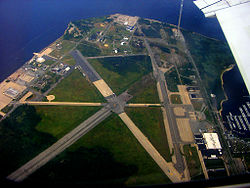Floyd Bennett Field Historic District | |
 Floyd Bennett Field in 2006 | |
 | |
| Location | Flatbush Avenue, Brooklyn, New York |
|---|---|
| Built | 1928–1930 |
| Architect | Department of Docks |
| Architectural style | |
| NRHP reference No. | 80000363[1] |
| Added to NRHP | April 11, 1980 |
Floyd Bennett Field is an airfield in the Marine Park neighborhood of southeast Brooklyn in New York City, along the shore of Jamaica Bay. The airport originally hosted commercial and general aviation traffic before being used as a naval air station. Floyd Bennett Field is currently part of the Gateway National Recreation Area's Jamaica Bay Unit, and is managed by the National Park Service (NPS). While no longer used as an operational commercial, military, or general aviation airfield, a section is still used as a helicopter base by the New York City Police Department (NYPD), and one runway is reserved for hobbyists flying radio-controlled aircraft.
Floyd Bennett Field was created by connecting Barren Island and several smaller islands to the rest of Brooklyn by filling the channels between them with sand pumped from the bottom of Jamaica Bay. The airport was named after Floyd Bennett, a noted aviator who piloted the first plane to fly over the North Pole and had visualized an airport at Barren Island before dying in 1928; construction on Floyd Bennett Field started the same year.[2] The airport was dedicated on June 26, 1930,[3] and officially opened to commercial flights on May 23, 1931.[4] Despite the exceptional quality of its facilities, Floyd Bennett Field never received much commercial traffic, and it was used instead for general aviation. During the interwar period, dozens of aviation records were set by aviators flying to or from Floyd Bennett Field.[5]
Starting in the 1930s, the United States Coast Guard and United States Navy occupied part of the airport. With the outbreak of World War II, Floyd Bennett Field became part of Naval Air Station New York on June 2, 1941,[6][7] and Floyd Bennett Field was a hub for naval activities during World War II. After the war, the airfield remained a naval air station operated as a Naval Air Reserve installation. In 1970, the Navy stopped using NAS New York / Floyd Bennett Field,[8] though a non-flying Naval Reserve Center remained until 1983. The Coast Guard continued to maintain Coast Guard Air Station Brooklyn for helicopter operations that remained through 1998 when it, too, was decommissioned. Following the Navy's departure, several plans for the use of Floyd Bennett Field were proposed, although use as a civilian airport for fixed-wing operations was considered untenable due to the proximity to and extensive commercial air traffic associated with, John F. Kennedy International Airport. In 1972, it was ultimately decided to integrate the airport into the Gateway National Recreation Area. Floyd Bennett Field reopened as a park in 1974.[9]
Many of the earliest surviving original structures are included in a historic district listed on the National Register of Historic Places, being among the largest collections and best representatives of commercial aviation architecture from the period, and due to the significant contributions to general aviation and military aviation made there during the Interwar period.[1] Floyd Bennett Field also contains facilities such as a natural area, a campground, and grasslands.[10]
- ^ a b "National Register Information System". National Register of Historic Places. National Park Service. March 15, 2006.
- ^ Historic Structure Report Volume 1 1981, p. 25.
- ^ Cite error: The named reference
NYTimes-DedicatesFBF-1930was invoked but never defined (see the help page). - ^ Wrenn 1975, p. 13.
- ^ Historic Structure Report Volume 1 1981, p. 47.
- ^ Cite error: The named reference
NYTimes-Air-Show-1941was invoked but never defined (see the help page). - ^ Cite error: The named reference
NYTimes-Phaseout-1970was invoked but never defined (see the help page). - ^ Cody 2009, p. 172.
- ^ Cite error: The named reference
fbf-mapwas invoked but never defined (see the help page).